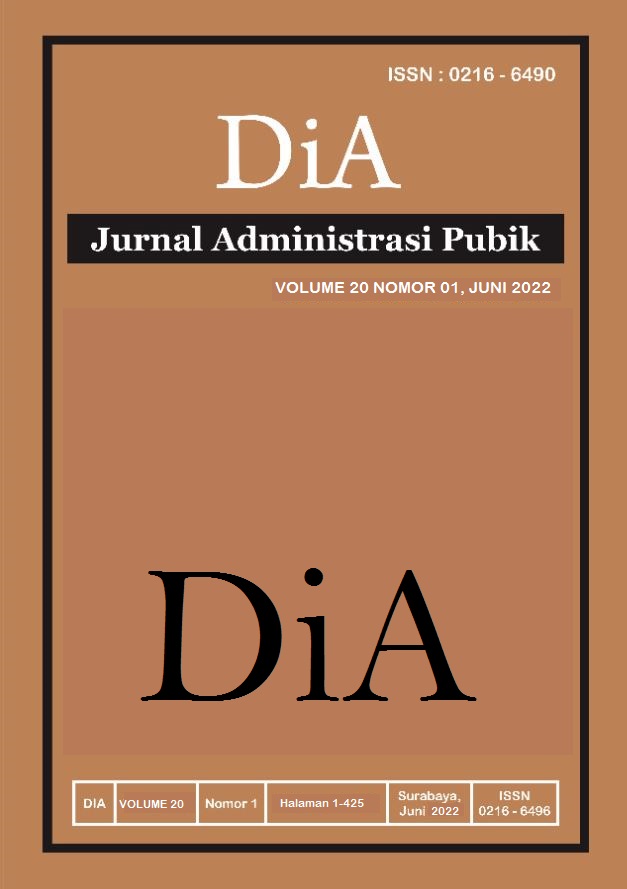ANALYSIS OF HUMAN GOVERNANCE IN THE INCLUSIVE VILLAGE PROGRAM FOR PEOPLE WITH DISABILITIES IN BEDALI VILLAGE LAWANG DISTRICT MALANG REGENCY
DOI:
https://doi.org/10.30996/dia.v20i01.6336Keywords:
Human Governance, Inclusive Village, DisabilityAbstract
An inclusive village is a living space for a diverse community. Inclusive village governance is managed in an innovative and humanistic manner. This is in accordance with the theory of human governance. Human governance is a new culture for public administration. It can also be referred to as an effort to humanize public administration as a view that wants to explain different and innovative perspectives. This study aims to analyze human governance in an inclusive village program for persons with disabilities in Bedali Village, Lawang District, Malang Regency. The method used in this study is a qualitative descriptive approach using the theory of human governance. Data collection techniques were carried out through interviews, observation, and documentation. The results of this study indicate that the inclusive village program in Bedali Village has not fully met the principles of human governance because of the 9 principles of achieving goals. There are still 7 principles that can be implemented well from the inclusive village program which includes education for citizens, equality and freedom, participation, sustainability, subsidy assistance, adaptive government administration performance, and reliability. Social accountability has not been successful because of the absence of an inclusive village accountability report. Meanwhile, competition at the global level has not been successful because there are no village regulations regarding inclusive villages.
Downloads
References
Bahua, M. I. (2018). Perencanaan Partisipatif Pembangunan Masyarakat. Gorontalo: Ideas Publishing.
Creswell, J. W. (2019). Research Design Pendekatan Metode Kualitatif, Kuantitatif, Dan Campuran. Yogyakarta: Pustaka Pelajar.
Dewi, R. K., Pramana, R. P., Sadaly, H., Dewi, R. K., Pramana, R. P., & Sadaly, H. (2020). Kendala Mewujudkan Pembangunan Inklusif Penyandang Disabilitas. Jakarta: The SMERU Research Institute.
Direktorat Jenderal Pembangunan dan Pemberdayaan Masyarakat Desa. (2019). Panduan Fasilitasi Desa Inklusif. Jakarta: Kementerian Desa, Pembangunan Daerah Tertinggal, Dan Transmigrasi Republik Indonesia.
Dwiyanto, A. (2018). Mewujudkan Good Governance Melalui Pelayanan Publik. Yogyakarta: Gadjah Mada University Press.
Hanapiyah, Z. M., Daud, S., & Abdullah, W. M. T. W. (2016). Human Governance and Level of Corruption Risk. Procedia Economics and Finance, 35(16), 127–135.
Hertati, D. (2021). The Effectiveness Of The Social Security Provider (BPJS) Program In Health Service At Syarifah Ambami Rato Ebu Hospital, Bangkalan City. DiA: Jurnal Administrasi Publik, 19(2), 143–153.
Josep. (2018). Perbandingan Tata Pemerintah Antara Good Governance Dan Sound Governance. Jakarta: Indocamp.
Maftuhin, A. (2016). Mengikat Makna Diskriminasi: Penyandang Cacat, Difabel, dan Penyandang Disabilitas. Inklusi: Journal of Disability, 3(2), 139–162.
Mutrofin, & Widodo, A. (2020). Kebijakan Pembangunan Desa Inklusif: Analisis Monitoring dan Evaluasi di Kelurahan Sidorejo, Kulonprogo D.I Yogyakarta. Empower: Jurnal Pengembangan Masyarakat Islam, 5(2), 40–56.
Nawangsari, E. R. (2016). Analisis Program Pemberdayaan Masyarakat Pada Usaha Menengah Kecil Dan Mikro (UMKM) (Studi Di UMKM Pengrajin Batik Kampoeng Jetis Dan Pengrajin Koperasi Intako Tanggulangin Sidoarjo). JPSI (Journal of Public Sector Innovations), 1(1), 12–16.
Ndaumanu, F. (2020). Hak Penyandang Disabilitas: Antara Tanggung Jawab Dan Pelaksanaan Oleh Pemerintah Daerah. Jurnal HAM, 11(1), 131–150.
Probosiwi, R. (2017). Desa Inklusi sebagai Perwujudan Pembangunan Berkelanjutan bagi Penyandang Disabilitas. Media Informasi Penelitian Kesejahteraan Sosial, 41(3), 217–228.
Rusyan, T. (2018). Membangun Desa Berprestasi. Jakarta: Bumi Aksara.
Santoso, M. B., & Apsari, N. C. (2017). Pergeseran Paradigma dalam Disabilitas. Intermestic: Journal of International Studies, 1(2), 166–176.
Toha, M. (2014). Ilmu Administrasi Publik Kontemporer. Jakarta: Kencana.
Undang-Undang Republik Indonesia Nomor 6 Tahun 2014 Tentang Desa.
Undang-Undang Republik Indonesia Nomor 8 Tahun 2016 Tentang Penyandang Disabilitas.
Wahyudi, K. E. (2019). Mewujudkan Good Governance dalam Implementasi Program Pemberdayaan Badan Usaha Milik Desa di Jawa Timur. Journal of Economics Development Issues, 2(02), 43–52.
Widjaja, A. H., Wijayanti, W., & Yulistyaputri, R. (2020). Perlindungan Hak Penyandang Disabilitas dalam Memperoleh Pekerjaan dan Penghidupan yang Layak bagi Kemanusiaan. Jurnal Konstitusi, 17(1), 197–223.
Downloads
Published
How to Cite
Issue
Section
License
The DiA journal allows authors to retain the copyright of their papers without limitation. Authors may grant publishers non-exclusive publishing rights to publish articles. Granting first publishing rights to publishers also qualifies as unlimited copyright (because there are no restrictions imposed by publishers on author copyright).







